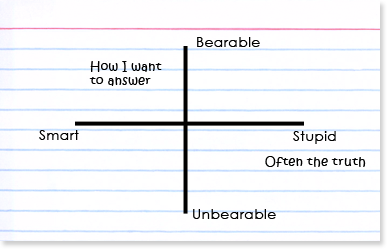As part of my wrap-up at Floundering Non-Profit I had an exit interview with TemporaryBigBoss during which the fact that I had problems with Floundering Non-Profit’s lack of structure. TemporaryBigBoss laughed when he heard that I was going to the Federal government remarking that I would have plenty of structure as a Fed. I agreed with him at the time but it’s turning out that we were both wrong.
Structure is systemic. It is dependable processes that make sense allowing people to put their actions to certain events on automatic. They don’t have to think because they know if A then B. Structure has responsibility and accountability built in to it.
It is not filling out a form simply because it’s time to fill out a form. It’s not requiring your employees to account for every minute of their work days when they’re working from “an alternate location.” It’s also not telling your employees one thing, like that there is no overtime unless it’s pre-authorized, but then issuing them blackberries and expecting them to be constantly available. These are rules for the sake of rules, and the Fed has plenty of rules and not all of them make sense.
Starting in December the Department for which I work is requiring that every employee use a special badge with a chip in it to log into her computer. Digital certificates do provide more security than an id + password system particularly because it requires that users remember only an eight digit number which they theoretically picked specifically because it is memorable. So, no more forgetting your badge in your other pants and getting a temporary stick-on badge for the day from security.
And that’s fine. It is a government building and it’s the government’s computer equipment and systems which gives the government the right to control how its employees access those resources. It’s their right to set the rules for accessing their systems and facilities. What’s not taken into account with this new rule, what doesn’t consider the structure of the Department’s day to day business is the fact that if you are a new employee it takes 4-6 weeks after all your paperwork is in to get a badge with a chip in it.
Four to six weeks during which you will be unable to login to your computer, access your email, or get into any of the network systems you might need to do your job.
Rules are not structure.

